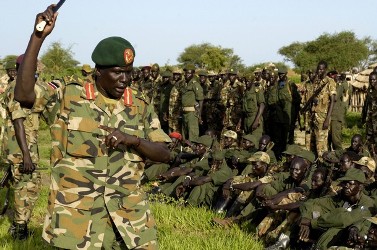S. Sudan rebel commander says rivalry undermines struggle
January 10, 2017 (JUBA) – A top South Sudanese rebel commander has warned that rivalry between two rebel factions poses a threat to the cause for which the two camps pledged to pursue jointly.

Observers say disputes between Machar’s predominantly ethnic Nuer and Lam Akol’s Shilluk is attributed to the latest wave of power struggles between the rival factions.
The violence includes political assassinations disrupting the common goal for which the two rebels came into existence and threatens to destabilize the entire country.
So far, 2 top rebel commanders, all allied to Akol’s National Democratic Movement — have been assassinated in what seems a contest for influence and control of the area.
Peter Gadet, a top rebel commander and one of those who defected from Machar before the signing of the 2015 peace agreement, sees a link between the two rebel factions as a threat to the cause for taking arms struggle against the Juba regime.
“Everyone was caught by surprise by what happened in Upper Nile. Nobody was expecting that. Nobody was expecting that the differences in views would escalate into the killings between colleagues whose objective is one: to remove the dictatorial regime under Salva Kiir in Juba. By turning on each other in the bush, what have they achieved than killing themselves?” Gadet told Sudan Tribune on Tuesday.
He added, “They have now empowered the regime, which I believe is the one engineering this. It is the regime”.
Gadet said rivalry has shifted to who should have leverage and control over the local people.
“This wave of violence shows there is a real threat that it would derail the focus on the main cause for which these movements were formed. “We are now talking about a security situation that is different than the sectarian fighting, when there are groups fighting against the government and against those who cooperated with the government,” the top rebel commander stressed.
“We now have two main groups in the same community and they both accept the political process. But each one wants to be the sole representative of the movement and within the area,” he added.
Last week, top rebel commanders, Gabriel Tanginye and Yohanis Okiech were killed in an apparent power struggle in South Sudan’s Upper Nile state.
(ST)
